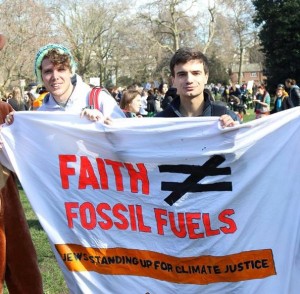Faith changes everything – the missing element in climate activism

The sorrowful facts are all too familiar. Our ecosystems are being destroyed. Extreme weather is becoming more frequent and more destructive. Emissions of greenhouse gases are the highest in human history. From droughts in the Sahel, to lethal heat waves in South Asia, to super-typhoons in the Philippines, severe climate impacts are already being felt by the world’s most vulnerable people. In essence, we are rapidly wrecking the planetary conditions necessary for our survival.
Unfortunately, we lack a movement with the sufficient power to instigate the transformative changes we need. The crucial challenge for the climate movement has become: how do we urgently build power? How do we build up the sufficient forces to disrupt the status quo and ignite a swift transition towards a sustainable economy?
The answer lies in vigorous outreach, in building a stronger movement beyond the traditional environmentalist demographic. Faith communities represent some of the most important constituencies that must be included into the climate conversation.
This is already starting to happen. The last few months have seen faith leaders around the world stake out significant positions on climate justice. Earlier in the year, over 340 rabbis signed the Rabbinic Letter on the Climate Crisis, calling for “a new sense of eco-social justice”, a joining-up of those working to address social and ecological injustice.
Numerous Buddhist organizations and councils launched A Buddhist Declaration on Climate Change, decrying “our present [unsustainable] economic and technological relationships with the rest of the biosphere”.
Pope Francis’ seminal Laudato Si encyclical, released in May, levels a blistering critique at our economic model, making an urgent call for “unified global action” to address our interwoven social and environmental crises.
The landmark Islamic Declaration on Climate Change, issued in August by a major group of Islamic scholars, demands a phase-out of fossil fuels, condemns the reckless pursuit of unlimited economic growth, and calls on the world’s 1.6 billion Muslims to play a lead role in combatting climate change.
These vociferous statements are not surprising; religious scriptures and traditions are imbued with teachings of fairness for future generations, environmental stewardship, and love for the poorest and most vulnerable in society.
But their articulation could not come at a more opportune time. With a pivotal COP21 summit taking place in Paris towards the end of the year, and world attention converging on environmental issues, we need a plurality of voices emphasising the reality of climate change as a colossal moral disaster that can only be dealt with through substantive and wide-reaching action.
In the UK, Oil Vay is a new organization hoping to be a part of that plurality. Our mission is to invigorate a bolder response to climate change in the Jewish community. We are passionate about climate justice, about an approach to ecology that does not overlook racism or inequity, that is accountable to those on the frontlines of the climate crisis. We work to educate and mobilize within our community, whether that means running educational workshops or taking action in solidarity with indigenous peoples around the world resisting dirty energy projects. Inspired by the flourishing fossil fuel divestment movement, we also work to ensure that our ecological commitments as a community extend to the portfolios of our communal bodies.
Together with allies and colleagues from across the world, we are trying to help build a bolder, more diverse, and more powerful movement, capable of bringing about major progress in the struggle for a fairer and more sustainable world. If we fail to engage across our different communities, if we fail to amass strength in diversity, then our chances of succeeding remain despairingly slim.




Leave a Reply